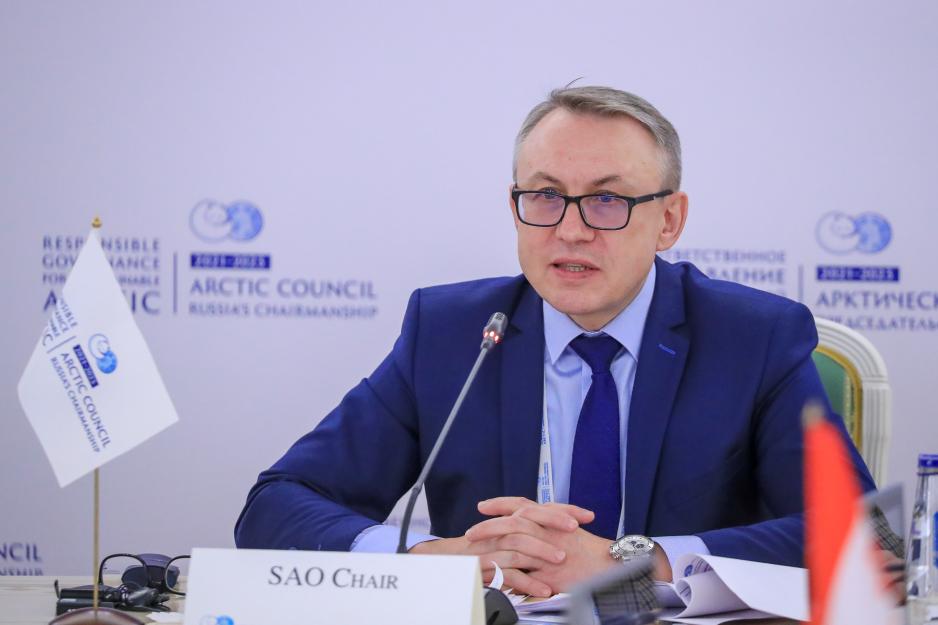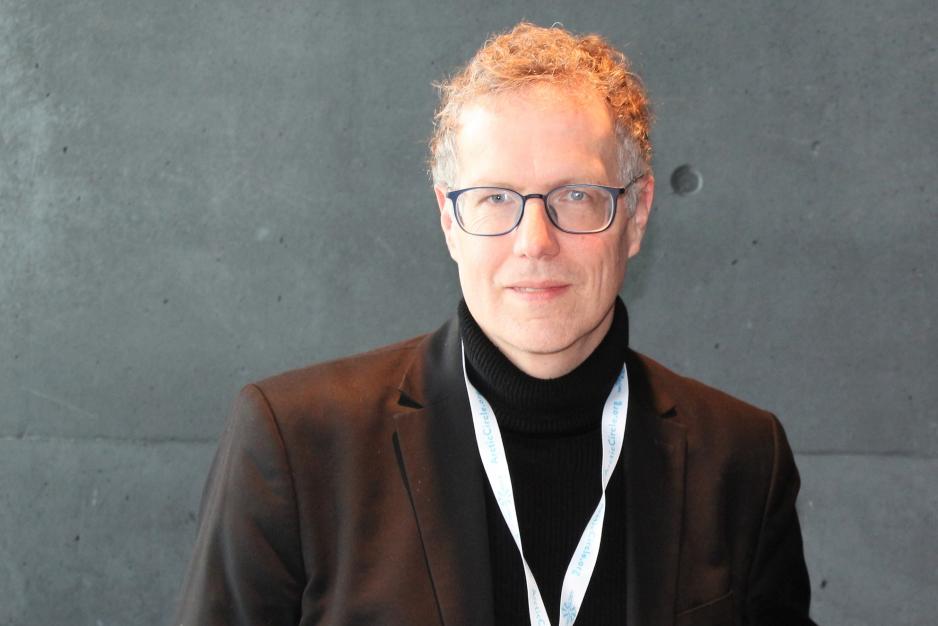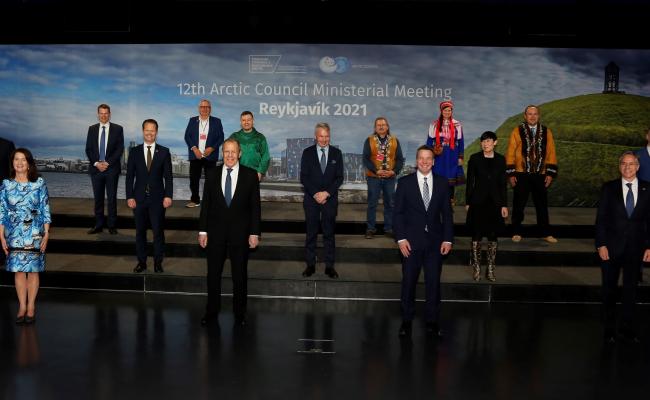Russian Chair of the Arctic Council: “The Council’s Work Should Be Resumed As Soon As Possible”

Russia’s Arctic Ambassador and Chair of the Arctic Council Nikolay Korchunov during a plenary meeting for Arctic officials in the fall of 2021. (Photo: Vyacheslav Viktorov/Roscongress).
Russia’s approach to Arctic cooperation can also be “adjusted” should Finland and Sweden join NATO, says Russian top diplomat at the Arctic Council. Mild Russian criticism of Finnish and Swedish NATO applications, researchers argue.
“The Arctic Council is and should remain the key international forum of the Arctic region”, Russia’s Chair of the Arctic Council Nikolay Korchunov writes in an email to High North News.
“The future of the Council will depend on the Arctic countries’ spirit of cooperation and commitment to collective approaches and solutions. We confirm that this work should be resumed in full as soon as possible. This would be in the interest of all the Arctic states and the welfare of Arctic inhabitants and indigenous people”, he continues.
Early in March, the circumpolar Arctic forum’s activities were paused by the seven western Arctic states due to Russia’s launching a war on Ukraine. Since then, they have sought solutions as to how to resume this work.
The Russian Council chairmanship has, on the other hand, focused on domestic Arctic development and conducted scheduled events without western participation.
Ready for dialogue
Last Friday at a press conference, Korchunov informed about the first year of Russian chairmanship at the Arctic Council.
Russia is ready to resume dialogue with other countries within the framework of the Council and will seek to minimize negative consequences of the current pause to its work, he said at the press conference, according to the Russian news agency TASS.
Continuing, Korchunov referred to US Coordinator for the Arctic Region James P. DeHart’s statement earlier in May regarding a change to the structure or membership of the Council’s not being on the agenda.
He also referred to the recent Finnish and Swedish applications for NATO membership. If these are approved, all member states of the Council – except for Russia – will be members of the military alliance.
“We must understand that a change to the countries’ military-political status may of course lead to some adjustments in the development of cooperation in the higher latitudes. Time will show what these will be” Korchunov said, according to RIA Novosti, another Russian news agency.
Finland and Sweden have to a significant extent contributed to the preserving of the Arctic as a peaceful, stable region.
Hard security issues
Korchunov expounds the Russian perspective on implications for Arctic cooperation stemming from a potential Finnish and Swedish NATO membership to High North News. However, he does not reply to what kind of “adjustments” that may be considered relevant from the Russian side.
Although military security is not a part of the Arctic Council mandate, Arctic cooperation may nevertheless be affected by different factors related to hard security questions, he points out.
“With their traditional non-military alliance policy, Finland and Sweden have to a significant extent contributed to the preserving of the Arctic as a peaceful, stable region with low tension, which has a.o. been a result of non-proliferation of NATO activities and expansion of the Alliance”, the Russian diplomat writes.
Russia firmly believes that there are no problems in the High North that require military solutions
Insecurity may lead to militarization
Continuing on, Korchunov refers to well-known Russian problematizing of increasing NATO activity in the Arctic, such as the Cold Response 2022 exercise in Norway, arguing that the potential expansion of the Alliance may “lead bring with it further elements of insecurity and unpredictability to the region”.
“This, in turn, may lead to militarization of the region and growth in the corresponding expenses which, in turn, may affect budgets for development, environmental protection, as well as climate protection measures. This may be the most immediate consequence for Arctic cooperation”, he states and continues:
“Russia firmly believes that there are no problems in the High North that require military solutions. The Arctic is a region with high potential for peaceful cooperation about climate changes, the transition to low-emission energy, and strengthening of welfare for its inhabitants and indigenous population.”
“We hope that all the Arctic states that have committed to maintaining peace, stability and constructive relations as stated in the Arctic Council ministerial statement in 2021, will continue to remain unconditionally guided by this.”
A surprisingly mild signaling of Russia’s not being happy that they seek to join NATO
See signs of Russian pause acceptance
Korchunov’s statement provide clear signals that Russia is keen to continue cooperation through the Arctic Council, argues Research Professor Timo Koivurova at the Arctic Center of the University of Lapland in Northern Finland.
“In my view, Russia also seems to accept that the ‘Arctic seven’ so far cannot continue cooperation through the Council with Russian participation, and that the only way through which the Council may move forward now involves a break in interaction with the Russian side”, Koivurova says.
“As for its referral to Finland and Sweden, Korchunov is probably deliberately ambiguous in his wording, and it is hard to say what these ‘adjustments’ may be. This is a mild, actually surprisingly mild, signaling about Russia’s not being happy that they seek to join NATO”, he points out.
Koivurova sees the ‘Arctic seven’ as trying to hammer out a temporary solution for resuming the work of the Arctic Council that creates space for Russian participation at a later time.
“When it might be possible, I believe Russia will want to return to this cooperation, even though all cooperating partners may be NATO members by then. Russia considers the Arctic Council a very important forum, and more important than the Baltic Sea Council, from which it withdrew this winter”, he says.
Much of Russia’s High North policy requires continued interaction with other regional authorities
Also signs of Russian frustration
Associate Professor Marc Lanteigne at UiT Norway’s Arctic University agrees that Moscow’s criticism of Finland and Sweden is demure.
“This reflects Russia’s many setbacks since the war started, and also quite likely a desire to separate the invasion of Ukraine from other aspects of Russian security policy. Much of Russia’s High North policy also requires interaction with other regional authorities, in particular on environmental and indigenous people’s issues”, he says.
In Korchunov’s statements Lanteigne also reads Russian frustration over what it perceives to be unjust spreading of international condemnation of the Ukraine war into the Arctic cooperation frame.
“Russia can, ironically, accuse the other Council members of pulling military issues into Arctic diplomatic discourse and draw images of these as revisionist”, he points out.
“Korchunov’s remarks also reflects Russia’s interest in separating the invasion of Ukraine from security in the Arctic region, a divide that the other Arctic states rightly find it hard to recognize.”
“In addition, these statements illustrate Moscow’s interest in defining Russian military buildup and exercise activity in the Arctic as strictly defensive, while also simultaneously painting NATO as being in charge of undermining the general security situation in the High North”, Lanteigne argues.

Associate Professor Marc Lanteigne at the University of Tromsø, Norway (Photo: Trine Jonassen)
We look favorably upon Chinese participation in energy projects in Russia’s Arctic zone
Invited China to more cooperation
At the aforementioned press conference, Korchunov also spoke about how Russia, while the activities of the Arctic Council are paused, continues regional development in the Russian Arctic and cooperates with Council observers, such as China.
“We look positive upon Chinese participation in energy projects in Russia’s Arctic zone. This applies in particular to the projects Yamal LN and Arctic LNG 2” Korchunov said, according to TASS.
Continuing on, he said that the country welcomes Chinse activities in participating in other projects in Russia’s Arctic region, also within the framework of the Arctic Council.
Korchunov then pointed to energy, including carbon-free energy, and development of the Northern Sea Route (NSR) and related coastal infrastructure, as key areas of Sino-Russian cooperation.
Does not believe in a divided Arctic
In a recent op-ed on The Polar Connection website, Koivurova and Lanteigne address the issue of whether the Arctic is about to be “divided in two” following the Ukraine war, with the ‘Arctic seven’ on the one side, and Russia and China on the other side.
The two researchers argue that it will not necessarily go that way. Amongst others, they refer to how the ‘Arctic seven’ express hope about a return to normalcy with all the eight Arctic states at the Arctic Council on a later stage.
They also point to a series of factors that do not indicate a Russian-Chinese alliance in the Arctic.
Even though Beijing avoids direct criticism of Russia’s war on Ukraine and Chinese media often blame the USA and NATO for having caused the Ukraine conflict, and while Korchunov now expresses a desire for more Sino-Russian cooperation in the Arctic, there are few reasons to consider an alternative Arctic regime with Sino-Russian directions imminent”, Lanteigne says to High North News.
A scenario with a divided Arctic will be a nightmare to both Russia and China
Need a united Arctic
“A scenario with an Arctic divided in two will be a nightmare to both Russia and China. Both countries’ governments need open communication lines to promote many of their regional interests. And Beijing’s Polar Silk Road initiative was developed on condition of an open Arctic region, not one which is walled off”, Lanteigne points out.
He also refers to scientific cooperation between the two countries’ being strongly reduced since the beginning of the Ukraine war, and that Chinese oil companies such as Sinopec have postponed their participation in all new projects in Siberia.
“It was also recently announced that several Chinese companies have to withdraw from participation in the cornerstone project Arctic LNG 2 in Siberia due to concerns about violating the EU’s and other states’ sanctions against Russia”, Lanteigne says.
Also read
This article was originally published in Norwegian and has been translated by HNN's Elisabeth Bergquist.




